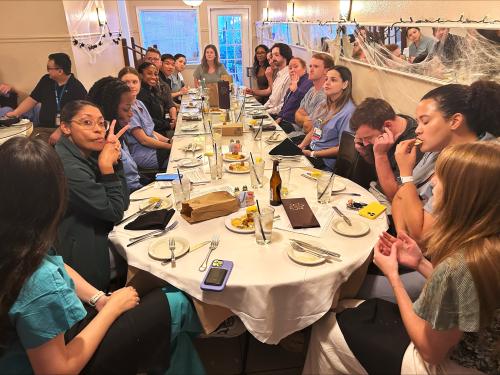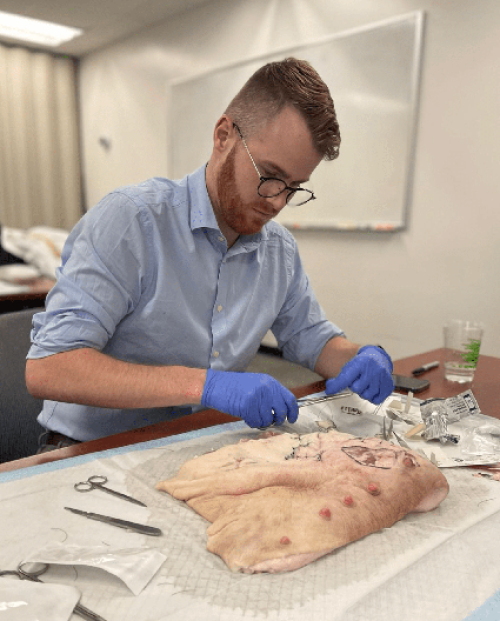In addition to comprehensive clinical training, Tulane surgery residents benefit from a variety of didactic and simulation experiences led by a diverse and dedicated faculty.

SCHOOL NIGHT
The cornerstone of education at Tulane Surgery is School Night.
Tuesday nights are School Nights, time set aside and protected for resident education. School Night has several components which are rotated through to offer a balance of medical knowledge expansion and ABSITE, Board, and career preparation.
Didactic Presentation
Every Thursday, the first half of the didactic session is dedicated to presentations by mid-level residents about the weekly topic. The resident works ahead of time with a faculty moderator with expertise in the topic to prepare the presentation.
Board Preparation
The second half of the conference, led by a faculty member, is usually dedicated to either a review of SESAP questions or oral-boards-style review questioning of senior residents.
Journal Club
Six times a year, the second half of School Night is given over to Journal Club. Journal Club is an opportunity for residents to keep abreast of the latest surgical research in a social environment. Journal Club is hosted by a rotation of Tulane faculty. Faculty choose current journal articles of particular interest in their specialty, and residents discuss the articles over dinner.

Transition to Practice
What happens when you ask program graduates what they wish they had known about being a new surgeon? Transition to Practice is an educational series that prepares senior residents for the business and practical aspects of being a surgeon. Six times a year, a Transition to Practice session is led by a surgeon, lawyer, financial planner, or other professional.
Ditch Night
Twice a year, all Tuesday educational activities are canceled, and School Night becomes Ditch Night! On Ditch Nights, residents choose a casual social activity such as visiting a local bar. The goal of Ditch Night is to make time for residents to relax and bond without adding to their already busy schedules. Ditch Night is one of many wellness initiatives for Tulane Surgery Residents.
Morbidity & Mortality Conference
M&M is held every Friday morning from 7:00-8:00 am. The senior resident from each service presents their cases for the week and briefly discusses any complications with the rest of the residents and faculty. A single prior case or topic selected for further discussion for educational benefit is then presented by a resident in a standardized format. Evaluation of outcomes and review of evidence-based recommendations is prioritized.
Grand Rounds
Grand Rounds is held every Friday morning, directly following M&M. Speakers include frequent visiting professors of national and international prominence, including several endowed lectureships. A wide variety of subjects pertinent to surgery are covered, including clinical topics, basic and translational science, educational development, professionalism, and leadership.

Simulation
Our program has a robust simulation experience to augment resident education. Residents participate in simulated clinical procedures in our sim lab through a dedicated simulation curriculum consistent with protected time from 9:00-11:00 am on Fridays to attend educational sessions in small groups in the simulation center from faculty instructors. Residents receive instruction in Fundamentals of Laparoscopic Surgery (FLS) and Fundamentals of Endoscopic Surgery (FES) and are able to complete their certification at our Simulation Center.
Robotics Curriculum
Our robotics curriculum starts with online courses and basic training certificates that all residents complete to be able to operate the DaVinci Robot safely. This training is universal and transferable across all hospitals. We then have dedicated simulation exercises for the beginning residents, which will translate to improved experience on cases as upper-level residents. The curriculum includes information on positioning and trocar placement strategy, safety, economy of motion, and more. We even have an advanced curriculum with the goal of completing DaVinci Robotics certification by the end of residency that can be transferred to future fellowship locations and practices.
Residents as Teachers
One of the pillars of our culture is the motto “Each One, Teach One.” We feel strongly that the development of teaching skills is a fundamental component of surgical resident education, and we have developed our Residents as Teachers curriculum to emphasize this, including weekly clinical topics for student education, resident-taught student skills labs and surgical labs, resident teaching for ATLS and Stop the Bleed courses, and a culture that encourages senior residents to teach junior residents in clinic, on rounds, and in the operating room. Our residents become excellent educators and often win teaching awards from their medical students.
Research
All residents must engage in scholarly activity during their training; however, a dedicated research year is not required. For residents who are interested, there is an option to take dedicated research time; this option is flexible and may be utilized for 1 or 2 years after either PGY2 or PGY3. There are many opportunities for research here at Tulane in both basic science and clinical research. Residents who choose to remain at Tulane for their research time are funded through the department. Residents may choose to conduct specialized research at another institution; these positions are externally funded.
Most residents conduct research projects without taking dedicated research time; all are encouraged and guided in their research pursuits by faculty mentors. The department funds travel for resident research presentations at regional, national, and international meetings. Residents may also choose to take dedicated time off during training to pursue other opportunities for professional development, such as critical care fellowship, master's degrees, etc.
Quality Improvement Program
We provide all of our residents with a structured curriculum in Quality and Patient Safety which includes relevant didactics woven into our conference schedule, online resources and toolkits, and peer-group collaboration by small groups of residents guided by faculty mentorship to conceive of, design, and implement quality improvement projects. As residents progress through the program, they develop progressive mastery of knowledge and skill that culminates in their ability to lead their teams through the QI process.
Additional Learning Resources
Supplemental materials available to the residents for basic science and clinical education include access to the SCORE question bank, the TrueLearn question bank, and Selected Readings in General Surgery, as well as a dedicated surgery resident library with hard copies of a variety of surgical textbooks and journals and online access to an extensive collection of surgical textbooks and journals through the school of medicine library.
ABSITE Preparation Mentorship
Residents in need of extra support may enroll in the ABSITE Preparation Mentorship program. The program is tailored to each resident’s unique study needs, but generally includes monthly meetings with a mentor to review study plans and strategies, weekly quizzes, and quarterly practice ABSITES.
